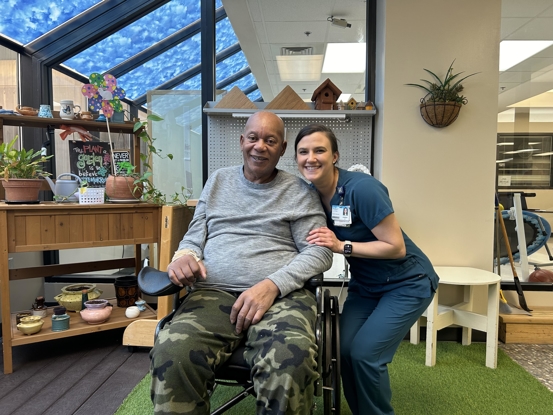What is Parkinson's Disease?
- Category: Education, Infirmary Medical Clinics, Neuroscience
- Posted On:
- Written By: Amanda Akey
April is Parkinson's Disease Awareness Month
What is Parkinson's Disease?
Parkinson's Disease is a brain disorder that leads to shaking, stiffness and difficulty with walking, balance and coordination. As the disease progresses the symptoms will worsen. People with Parkinson's may experience difficulty walking and talking as well as see mental and behavioral changes, sleep problems, depression, memory difficulties and fatigue.
How does Parkinson's affect the brain?
According to the National Institutes of Health, Parkinson’s Disease occurs when nerve cells in the basal ganglia, an area of the brain that controls movement, become impaired and/or die. These cells typically produce a vital brain chemical, dopamine. The absence of dopamine causes movement issues. Additionally, people with Parkinson's lose nerve endings that also produce norepinephrine, this brain chemical controls many of the body's functions including heart rate and blood pressure. The loss of norepinephrine can cause some non-movement features of the disease such as fatigue, irregular blood pressure and trouble digesting food.
Who is at risk for Parkinson's Disease?
Parkinson's affects both men and women, however, 50% more men are affected by the disease than women. Additionally, age is a strong risk factor with the majority of individuals first developing the disease around 60 years old.
Could I have Parkinson's Disease?
Everyone's battle with Parkinson's Disease is unique however, there are four main symptoms to watch out for:
- Tremor (trembling) in hands, arms, legs, jaw or head
- Stiffness of the limbs and trunk
- Slowness of movement
- Impaired balance and coordination, sometimes leading to falls
If those symptoms describe you or someone you love, schedule an appointment with your primary care physician today. A Parkinson's Diagnosis is based on an individual's medical history and a neurological examination. While there is no cure for Parkinson's, there are treatment opportunities to relieve some symptoms.
Infirmary Health Neuroscience Center of Excellence offers comprehensive neurosciences services for patients encountering neurological disorders. For more information, CLICK HERE.
For More Information About Parkinson's Disease
National Institute of Neurological Disorders and Stroke
800-352-9424
www.ninds.nih.gov
American Parkinson Disease Association (APDA)
800-223-2732
https://www.apdaparkinson.org/
Michael J. Fox Foundation for Parkinson's Research
800-708-7644
www.michaeljfox.org
Parkinson's Foundation
800-473-4636
www.parkinson.org


